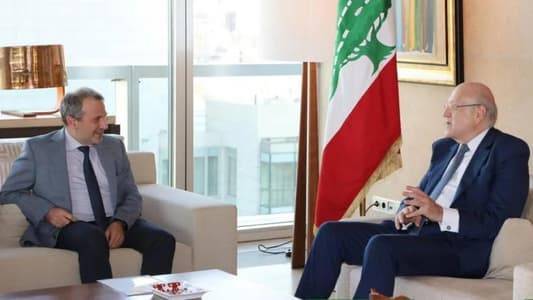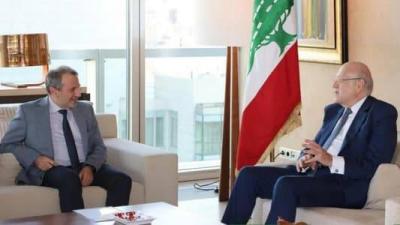Lebanon continues to face challenges due to the dominance of the March 8 forces over the presidential key, prolonging the vacancy in constitutional institutions. This situation prompts resigned Prime Minister Najib Mikati to call for a cabinet meeting in response to the pressing financial, living, and health challenges related to citizens' health and the transfer of financial credits. This could renew the political conflict between the "Free Patriotic Movement" and its allies in the March 8 forces, who constitute the majority of the government members.
While some political factions argue that "necessities permit prohibitions," interpreting the constitution as a matter of perspective aligned with their narrow interests, the current situation of a resigned government managing affairs amidst a presidential vacancy represents a historical precedent. This differs fundamentally from previous fully constitutional governments that assumed presidential duties after the expiration of mandates, such as that of Prime Minister Fouad Siniora after President Emile Lahoud's term, or Prime Minister Tammam Salam’s government which managed the vacancy for nearly two years and four months until General Michel Aoun's election in 2016.
During that time, each minister became a "de facto" president through their signatures, a scenario that Speaker of Parliament Nabih Berri is reluctant to see repeated with the current government, particularly since many ministers' decisions are directly or indirectly influenced by Free Patriotic Movement leader Gibran Bassil. Bassil has publicly opposed convening the caretaker government numerous times and has reportedly urged some ministers to boycott any government sessions should Mikati decide to proceed. It seems Mikati is on the verge of calling a session soon, raising discussions about the constitutionality of the session and the legal quorum required, especially if ministers close to Bassil refuse to participate based on the decision made by the Parliament regarding the message from former President Michel Aoun.
**No Decision Yet**
In the meantime, an official source clarified to "Nidaa Al-Watan" that a decision to call the cabinet to meet has yet to be made, pending discussions regarding the ministers’ responses to the call. The source pointed out that convening the cabinet requires a regular quorum, similar to the decisions to be made without needing unanimous agreement from all ministers.
The same circles believe that an extraordinary session should occur through an agreement between the President and the Prime Minister, interpreting the constitutional text in a way that distinguishes between "extraordinary calls" and "extraordinary sessions." They stress that cabinet meetings do not inherently fall into the category of extraordinary or otherwise, affirming the Prime Minister's role in calling for a cabinet meeting, while the President can collaborate with the Prime Minister to issue an extraordinary call when circumstances warrant it.
In this context, constitutional expert Dr. Said Malik points out that a caretaker government acts in a limited capacity per Clause 2 of Article 64 of the constitution, emphasizing its inability to convene regularly and exercise its powers comprehensively. He stresses that the cabinet should meet if "extraordinary circumstances" necessitate solving pressing issues but believes that the promotion of officers cannot be described as urgent and crucial enough to justify a meeting of a resigned cabinet. He places the allocation of health-related budgets and securing medicines for chronic diseases within the realm of urgent matters that require the cabinet to convene with a strictly emergency-focused agenda.
Regarding the quorum required to hold the session and the decision-making process therein, he noted that the government meets legally with two-thirds of its members present, per Article 65 provisions, while decisions can be taken by consensus or by a simple majority in ordinary matters and by a two-thirds majority on critical and essential issues outlined in Clause 5 of Article 65. Malik clarified that past governments' practices requiring unanimous ministerial consent contradict constitutional provisions since the powers of the President, pursuant to Article 62, shift to the cabinet as an institution rather than to individual ministers.
In related commentary, constitutional expert Dr. Adel Yamain expressed that Mikati’s desire to convene a cabinet session is misplaced, as no cabinet had previously met under a resigned government without a president. He explained that what constitutes a cabinet meeting under a considered resigned government is an extraordinary meeting, noting that the stipulations in Clause 12 of Article 53 indicate that extraordinary meetings must be convened by the President in agreement with the Prime Minister, emphasizing that the Prime Minister cannot act unilaterally in this regard. He highlighted the absence of a relevant authority to summon an extraordinary cabinet meeting during the presidential vacancy, making it unsuitable for the current cabinet to convene.
Yamain reflected on the Parliament's stance in response to former President Aoun's message, asserting that the cabinet cannot assume presidential powers during a caretaker government. Despite his reservations on the Parliament's response, which stated that a cabinet meeting in urgent circumstances requires the agreement of all government components, Yamain interpreted this consensus as a substitute for the constitutional invalidity of calling and convening during the presidential vacancy alongside a caretaker government, which may lead any minister to obstruct the cabinet's convening.
Furthermore, Minister Ramzi Musharrafieh confirmed to "Nidaa Al-Watan" the existence of several observations regarding the Prime Minister's actions, which might lead him to suspend his participation in cabinet meetings until outstanding issues with Prime Minister Najib Mikati are addressed.




